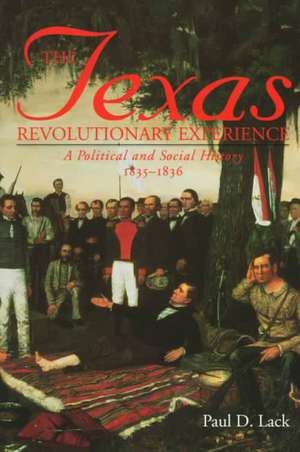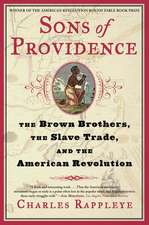Texas Revolutionary Experience: A Political and Social History, 1835-1836: Texas A & M Southwestern Studies (Paperback), cartea 0010
Autor Paul D. Lacken Limba Engleză Paperback – 31 mar 1999
This fresh perspective, drawn from exhaustive examination of primary documents (claims records and land documents as well as traditional manuscript collections), portrays the Texans entering their quarrel with Mexico as a fragmented people--individualistic, divided from one community to another by ethnic and racial tensions, and lacking a consensus about the meaning of political changes in Mexico. Paul D. Lack examines, one at a time, the various groups that participated in the Texas Revolution. He concludes that the army was highly politicized, overly democratic and individualistic, and lacking in discipline and respect for property. With the statistical profile of the army he has compiled, Lack puts to rest forever the idea that the Anglo community gave an overwhelming response to the call to arms. He details instead the tensions between army volunteers and the majority of Texans who refused military service. Lack provides the most satisfactory account of Texas Tories yet written and, in a particularly sensitive treatment of Tejanos, shows the dilemma Texas Mexicans faced in the conflict. He traces the role of black Texans, the panic within Texas over slave rebellion, and the problem of runaway slaves in the Revolution.
For the masses of Texans, Lack convincingly demonstrates, the Revolution was a time of dislocation and grief that even the eventual outcome of battle did not heal. This scholarly epic, sure to become a classic and a model for future research on the Revolution, shows clearly how the experiences of the years 1835-36 left a new nation burdened by political upheaval, social disorder, ethnic bitterness, and other consequences of a failed revolution, all of which helped to define the Texas identity for the future. In honoring the heroic legend of the Texas Revolution, generations of scholars and Texans themselves have cleansed the revolution of its messier--and perhaps more truly revolutionary--dimensions. Focusing on the pre-existing causes of the conflict of 1835-36 and the military execution of the war, they have neglected the political turbulence, regional disharmonies, conflicts of interest, social upheaval, and racial and ethnic strife that characterized the period. This groundbreaking work on the Texas Revolution offers the first systematic analysis of the event as political and social history.
This fresh perspective, drawn from exhaustive examination of primary documents (claims records and land documents as well as traditional manuscript collections), portrays the Texans entering their quarrel with Mexico as a fragmented people--individualistic, divided from one community to another by ethnic and racial tensions, and lacking a consensus about the meaning of political changes in Mexico. Paul D. Lack examines, one at a time, the various groups that participated in the Texas Revolution. He concludes that the army was highly politicized, overly democratic and individualistic, and lacking in discipline and respect for property. With the statistical profile of the army he has compiled, Lack puts to rest forever the idea that the Anglo community gave an overwhelming response to the call to arms. He details instead the tensions between army volunteers and the majority of Texans who refused military service. Lack provides the most satisfactory account of Texas Tories yet written and, in a particularly sensitive treatment of Tejanos, shows the dilemma Texas Mexicans faced in the conflict. He traces the role of black Texans, the panic within Texas over slave rebellion, and the problem of runaway slaves in the Revolution.
For the masses of Texans, Lack convincingly demonstrates, the Revolution was a time of dislocation and grief that even the eventual outcome of battle did not heal. This scholarly epic, sure to become a classic and a model for future research on the Revolution, shows clearly how the experiences of the years 1835-36 left a new nation burdened by political upheaval, social disorder, ethnic bitterness, and other consequences of a failed revolution, all of which helped to define the Texas identity for the future.
Preț: 199.88 lei
Nou
Puncte Express: 300
Preț estimativ în valută:
38.26€ • 39.35$ • 31.74£
38.26€ • 39.35$ • 31.74£
Carte tipărită la comandă
Livrare economică 17 februarie-03 martie
Preluare comenzi: 021 569.72.76
Specificații
ISBN-13: 9780890967218
ISBN-10: 0890967210
Pagini: 360
Dimensiuni: 146 x 238 x 22 mm
Greutate: 0.53 kg
Editura: Texas A&M University Press
Seria Texas A & M Southwestern Studies (Paperback)
ISBN-10: 0890967210
Pagini: 360
Dimensiuni: 146 x 238 x 22 mm
Greutate: 0.53 kg
Editura: Texas A&M University Press
Seria Texas A & M Southwestern Studies (Paperback)
Textul de pe ultima copertă
In honoring the heroic legend of the Texas Revolution, generations of scholars and Texans themselves have cleansed the revolution of its messier--and perhaps more truly revolutionary--dimensions. Focusing on the preexisting causes of the conflict of 1835-36 and the military execution of the war, they have neglected the political turbulence, regional disharmonies, conflicts of interest, social upheaval, and racial and ethnic strife that characterized the period. This ground-breaking work on the Texas Revolution offers the first systematic analysis of the event as political and social history. This fresh perspective, drawn from exhaustive examination of primary documents (claims records and land documents as well as traditional manuscript collections), portrays the Texans entering their quarrel with Mexico as a fragmented people--individualistic, divided from one community to another by ethnic and racial tensions, and lacking a consensus about the meaning of political changes in Mexico. Paul D. Lack examines, one at a time, the various groups that participated in the Texas Revolution. He concludes that the army was highly politicized, overly democratic and individualistic, and lacking in discipline and respect for property. With the statistical profile of the army he has compiled, Lack puts to rest forever the idea that the Anglo community gave an overwhelming response to the call to arms. He details instead the tensions between army volunteers and the majority of Texans who refused military service. Lack provides the most satisfactory account of Texas Tories yet written and, in a particularly sensitive treatment of Tejanos, shows the dilemma Texas Mexicans faced in the conflict. Hetraces the role of black Texans, the panic within Texas over slave rebellion, and the problem of runaway slaves in the Revolution. For the masses of Texans, Lack convincingly demonstrates, the Revolution was a time of dislocation and grief that even the eventual outcome of battle did not heal. This scholarly epic, sure to become a classic and a model for future research on the Revolution, shows clearly how the experiences of the years 1835-36 left a new nation burdened by political upheaval, social disorder, ethnic bitterness, and other consequences of a failed revolution, all of which helped to define the Texas identity for the future.














